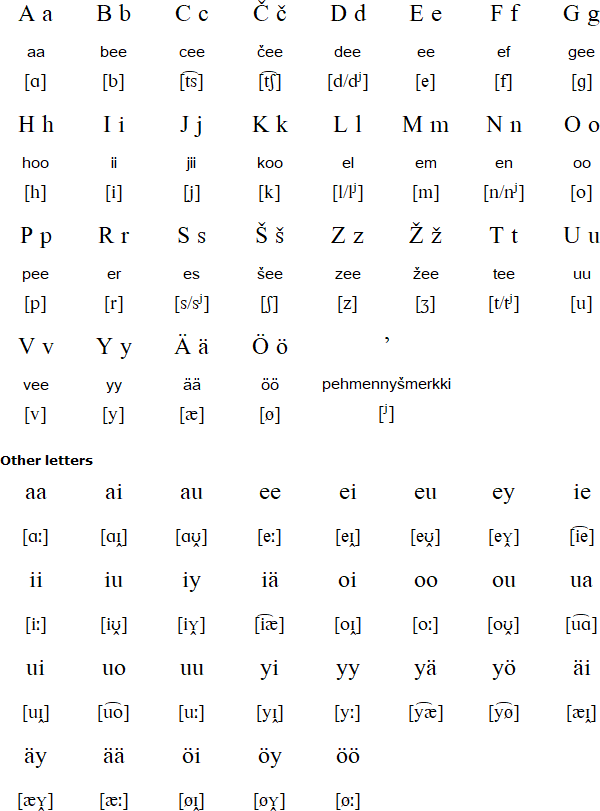Livvi-Karelian is Finnic language spoken mainly in the northwest of the Russian Federation, and also in southeastern Finland, by about 30,770. In 2010 there were 25,600 speakers of Livvi-Karelian in Russia, mainly in the Olonetsky, Pryazhinsky, Pitkyarantsky and Suoyarvsky districts of the Republic of Karelia, and also in the Leningrad Oblast. In Finland the language is spoken by about 5,170 people in the North Karelia and South Karelia regions.
Livvi-Karelian is also known as Liygi, Livvi, Livvikovian, Aunus, Olonets, Olonetsian, Southern Olonetsian or Karelian. It is classified as a dialect of Karelian in some sources.
In Russia few children are acquiring Livvi-Karelian in their families, although there are classes in the language in primary schools. The language is used to some extent in literature and newspapers, and on the radio and TV, and efforts have been made since the 1990s to revive it. In Finland most of the Livvi-Karelian speakers are elderly, and even fluent speakers mainly use Finnish as their everyday language.
An earliest known writing in Livvi-Karelian appears on birch bark letter no. 292 which was found in Novgorod in Russia in 1957, and dates from the 13th century. It is in fact the oldest written document in any Finnic language, and was written in a version of the Cyrillic alphabet. [More details].
Livvi-Karelian was written with the Cyrillic alphabet until the 1930s, when the Latin alphabet was introduced. An orthography for Livvi-Karelian was officially approved by the Government of the Republic of Karelia in 1989. A new version of the alphabet was introduced in 2007.

Download an alphabet chart for Livvi-Karelian (Excel)
Information about the Livvi-Karelian alphabet supplied by Wolfram Siegel (PDF)
A ku jiäzin täh. Luadizimmos taloih, suazin ičelleni viernoit ystävät emändäs, ižändäs da heijän pienis tyttölöis, kudamat nygöi ollah muarjas. Eläzin tiä heijänke, mečästelizin, kulleskelizin nenis syngis, pruazniekallizis salolois, viruttelizimmos, muaduzin tänne, kazvazin korbeh kiinni.
Or if I stayed here. I would pretend to be a house and make myself faithful friends of the hostess, the host, and their little girls who are now in the berry. I would live here with them, hunt, cuddle those gloomy, solemn secrets, lie down, lie here, grow up in the wilderness.
Details provided by Michael Peter Füstumum
Information about Livvi-Karelian | Phrases | Numbers
Information about Livvi-Karelian
https://en.wikipedia.org/wiki/Livvi-Karelian_language
https://de.wikipedia.org/wiki/Olonetzische_Sprache
https://ru.wikipedia.org/wiki/Ливвиковское_наречие
https://www.ethnologue.com/language/olo
Learn Livvi-Karelian
https://www.digitaldialects.com/iPad/Karelian.htm
Dictionary of Livvi-Karelian
https://kaino.kotus.fi/cgi-bin/kks/karjala.cgi
OmaMua - Livvi-Karelian newspaper
http://omamua.ru/
Estonian, Finnish, Karelian, Kven, Livvi-Karelian, Livonian, Ludic, Meänkieli, Seto, Veps, Võro, Votic
Languages written with the Latin alphabet
Page last modified: 23.04.21
[top]
You can support this site by Buying Me A Coffee, and if you like what you see on this page, you can use the buttons below to share it with people you know.

If you like this site and find it useful, you can support it by making a donation via PayPal or Patreon, or by contributing in other ways. Omniglot is how I make my living.
Note: all links on this site to Amazon.com, Amazon.co.uk
and Amazon.fr
are affiliate links. This means I earn a commission if you click on any of them and buy something. So by clicking on these links you can help to support this site.
[top]